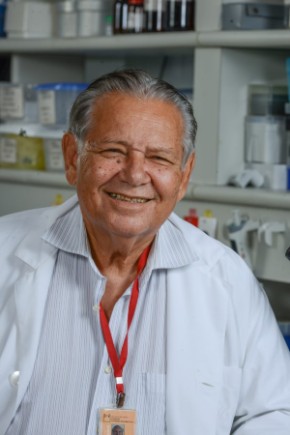Fiocruz specialist is considered the greatest specialist in cutaneous leishmaniasis
18/03/2021
Fiocruz Bahia
 Edgar Marcelino de Carvalho, a researcher of Fiocruz Bahia, was considered the world’s greatest specialist in cutaneous leishmaniasis by the site Expertscape. The ranking was based on science publications: Carvalho published 84 papers on the subject between 2010 and 2021. The ranking includes the 66 scientists with most papers published on cutaneous leishmaniasis from all over the world and also includes three other researchers of Fiocruz Bahia, Lucas Pedreira de Carvalho, Aldina Prado Barral, and Manoel Barral-Netto.
Edgar Marcelino de Carvalho, a researcher of Fiocruz Bahia, was considered the world’s greatest specialist in cutaneous leishmaniasis by the site Expertscape. The ranking was based on science publications: Carvalho published 84 papers on the subject between 2010 and 2021. The ranking includes the 66 scientists with most papers published on cutaneous leishmaniasis from all over the world and also includes three other researchers of Fiocruz Bahia, Lucas Pedreira de Carvalho, Aldina Prado Barral, and Manoel Barral-Netto.
In the field of cutaneous leishmaniasis, no other institution has better ranking researchers than the Oswaldo Cruz Foundation (Fiocruz). The ranking was based on the quantity and quality of the scientific papers published, by means of research in PubMed, where all articles published in medical journals in the past ten years were identified. The site Expertscape works as a search engine that ranks professionals and institutions by their experience in more than 29,000 biomedical subjects. Divided into categories, the list is ranked by the relative amount of experience of each region, institution, or specialist.
According to the World Health Organization (WHO), leishmaniasis is one of the world’s most neglected diseases. The disease is caused by protozoans of the Leishmania genus, which cause various clinical forms of leishmaniasis, classified in two large groups: tegumentary leishmaniasis, which affects the skin and the mucosas, and visceral leishmaniasis (or kala-azar), in which the parasites can be found mainly in the spleen, in the bone marrow, in lymph nodes and in the liver.
The studies carried out by Fiocruz Bahia focus on the interaction between Leishmania and its host (humans and canines), on the development of technologies applied to the diagnosis, and on the control of the disease (new drugs and vaccines). Research also tackles the investigation of basic aspects of the parasite’s biology, as well as of aspects related to the pathogenesis of the disease and the inflammation caused by the parasite.
Edgar Marcelino de Carvalho
Edgar Marcelino de Carvalho was born in Salvador, in the state of Bahia, and has a medical degree from the Federal University of Bahia (UFBA). He is specialized in Rheumatology and Immunology at the University of Virginia (USA), has a master’s and a doctor’s degree in Medicine and Health from UFBA, and a post-doctoral diploma in Immunology from the Weill Cornell Medical College (USA).
He is a researcher at Fiocruz Bahia and at the Immunology Service of the Professor Edgar Santos University Hospital and is a retired full professor of UFBA and of the Bahia School of Medicine and Public Health. He is also an assistant professor at the Weill Cornell Medical College and at the University of Iowa, both in the USA. His main areas of study are the immunopathogenesis of leishmaniasis, immunopathology and clinical manifestations associated with infection by HTLV-1, the immunopathogenesis of schistosomiasis, the influence of helminth-caused diseases on the immune response of chronic inflammatory diseases and autoimmune diseases, and immunotherapy in infectious diseases.
He coordinates the National Institute of Science and Technology in Tropical Diseases (INCT-DT), is a member of the Brazilian Academy of Sciences, of the Bahia Academy of Sciences, and coordinates one of the six Tropical Medicine Research Centers financed by the National Institutes of Health (NIH). Carvalho has been given several awards, including the Sendas Health Award (1993), for his contributions in the immunology of parasite diseases, the Commander of the National Order of Scientific Merit, awarded by the Ministry of Health and Technology, in 2005, and the Roberto Santos Scientific Merit Award, by the Foundation for the Promotion of Research from the state of Bahia (Fapesb), in 2018.




